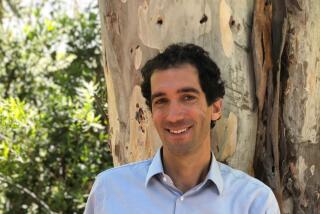Looking Truth in the Face : MEMOIR : THE SHADOW MAN,<i> By Mary Gordon (Random House: $24; 274 pp.)</i>
All of us, at some point in our lives, have been lied to by someone we love. The lie is not, of course, the worst part. The discovery of the lie is the worst part--that horrifying brainstem-meltdown moment when we realize that a person we trusted is not at all who we thought they were.
If the lie is big enough, the shattering that begins with our heart soon reverberates until the entire universe is spider-webbed with fault-lines and fracture, like a windshield just after impact. Most of us are able, in time, to pick up our own scattered bits. Some of us manage to adjust our line of vision so we don’t have to survey the rest of the damage every time we look out at the world. But few of us have the courage to ignore or clear away the rubble and follow the chorus of forces that led inexorably to the lie itself.
Mary Gordon’s “The Shadow Man” is not so much a story as an investigation, and not so much an investigation as a treatise--on deception and self-deception, on meaning and comprehension, on truth and forgiveness. Here are some facts: Gordon is a successful novelist and essayist. Her father died when she was 7 years old. “I’ve always thought that was the most important thing anyone could know about me,” she writes. She grew up in the company of Irish Catholic women, two of them--her mother and her aunt--maimed by polio. Throughout her adult life, she remained devoted to the memory of a father who was also a writer, brilliant, witty, graceful and kind. “No one could know me very well without knowing some of the high points of his history: His riotous youth at Harvard, then in Paris and Oxford in the ‘20s. His career as the king of Cleveland soft porn. . . . His conversion, in the late ‘30s, from Judaism to Catholicism, his turn at that time to the political right; his becoming a Francoist, a Coughlin-ite.”
Over the years, cracks appeared around the edges of the daughter’s shrine; many of David Gordon’s later writings were undeniably and virulently anti-Semitic, photos revealed a man less dapper than a child’s memory. After his death, a lie was revealed--a sister, Hattie, called to collect the body of the man who had claimed to be an only child. Then, when she was nearly 30, Gordon learned that her father had been married and divorced before he met her mother. He never told his second wife of his first family’s existence.
The devoted daughter took in these pieces of information and filed them under Father, Kindness and Protectiveness Proven.
Gordon wrote, inevitably, about her father--stray characters, essays, meditations and letters. The power and success of her first novel, “Final Payments,” elevated her into the pantheon of literary “usual suspects,” a sibyl to be consulted on all matters of family, feminism and faith, Catholic and otherwise. Death and dependency flecked her fiction; righteous anger and leftist politics her nonfiction.
Hovering in the margins of all her work was her father. Soon she realized she was slowly writing a book. About her father. But to do that, she knew, she would have to write about her father. Not about her memory of her father. The dutiful daughter must be made to sit quietly in the back bedroom while the scholar and the writer, those seekers of truth, did the work in the kitchen. “As I began to explore my memories, I was caught up in the impossibility of memory as a reliable source. What I had trusted as a text to live by began to seem as malleable as last week’s gossip, and as undependable. This loss of faith in memory was the first of the losses that came to me as a result of writing this book.”
The scholar and the writer soon took over the whole house. The timing of her decision was ironic--her search began just as her mother’s memory began to fail, taking with it the daughter’s simplest form of validation. To find her father, Gordon read what he wrote, again and again until even the dutiful daughter could not ignore what was before her--prose that was mediocre at best and full of arrogant, vituperative and often mad analysis and theorizing. The shrine began to splinter, its gilt flaked away in patches. “I am trying to make a resting place for him in words, a place that won’t be torn apart by the words he insisted on using: words that make me feel I have no right to love him. . . . I am drowning in the seas that surround me. The sea of an impossible love of a child for her father, the sea of oblivion, the sea of a daughter’s shame.”
She abandoned the words and turned toward facts. And on a pale snowy spring day, in the National Archives Research Room, the lie, and the truth in the lie, was revealed. The lie and the subsequent deceptions began spilling onto themselves, in a dark chittering mass, as from the last ill-advised pull in a game of pick-up sticks.
Mary Gordon’s father was not who he said he was. He was born in a different country, with a different language, under a different name than those he claimed for himself. There were sisters where he had avowed none. He did not attend Harvard, he did not attend Oxford, he did not attend any college at all. He never went to Paris. He was a son who abandoned his family, a Jew who turned on his people. His career was checkered with mediocrity and watered-down scams, a lifelong attempt, supported financially by his wife, to get others to bankroll his publishing schemes. David Gordon, it would seem, succeeded at nothing except fooling one young girl into worshiping him.
The shrine lay in pieces, the scholar and writer stood by appalled, even the dutiful daughter could not bear to touch it.
What she, they, did instead was raise the lie, with all its dark whelps hanging from it, into its place. The vision is terrifying in its finality--my father lied to me, to me, to me, to me--and its endless possibility: If he is not who I thought he was, then who am I? “I am trying to understand my father. . . . I have used the language and the methods of several professions: scholar, critic, historian, detective. None of them give me what I want: an explicable villain.
“I will not allow my father to be the villain of his own life.
“I will create a face, a stranger’s face, a villain’s face, from a multiplicity of features. . . . What is the nature of the crime? Murder of course. The crime of murdering the father I could, without difficulty, love.”
In the last third of “The Shadow Man,” Gordon commands all of her formidable powers of analysis, storytelling and imagery in a desperate attempt to find the reason behind the madness, the truth behind the deception. In the beginning, she is looking for a kind truth, an explanation that will still, in face of all the evidence, allow her tale a hero. It is difficult to take your eyes from her whirling, brilliant, often manic, sometimes inexplicable machinations--she spins and weaves, illuminates and darkens until finally the father is lost almost completely and all that is left is the daughter. The writer, the scholar, the dutiful daughter, exhausted, and finally able to see her real need--for truth, even an unkind truth. She loved and was loved by a man tattooed by the seams and scars of his own deception. Not necessarily a good man, but neither incapable of love. Certainly not for his daughter who is truly brilliant and fearless in her ability to look even when her eyes burn and her heart breaks, and to continue looking until she is able to forgive.
More to Read
Sign up for our Book Club newsletter
Get the latest news, events and more from the Los Angeles Times Book Club, and help us get L.A. reading and talking.
You may occasionally receive promotional content from the Los Angeles Times.







